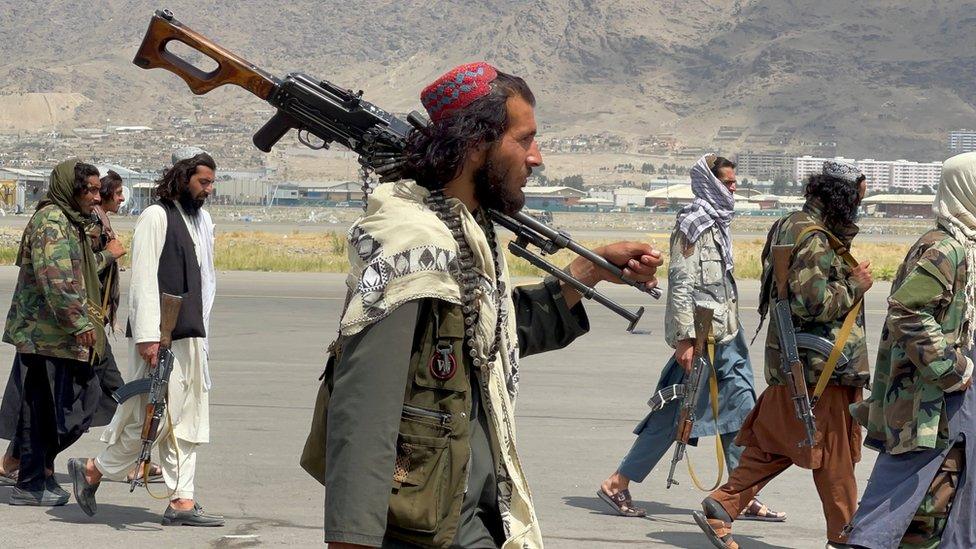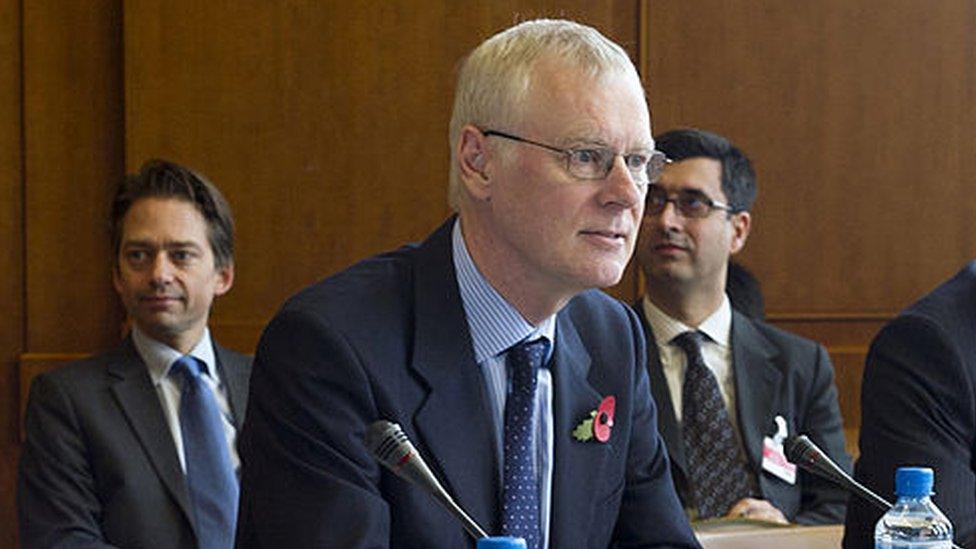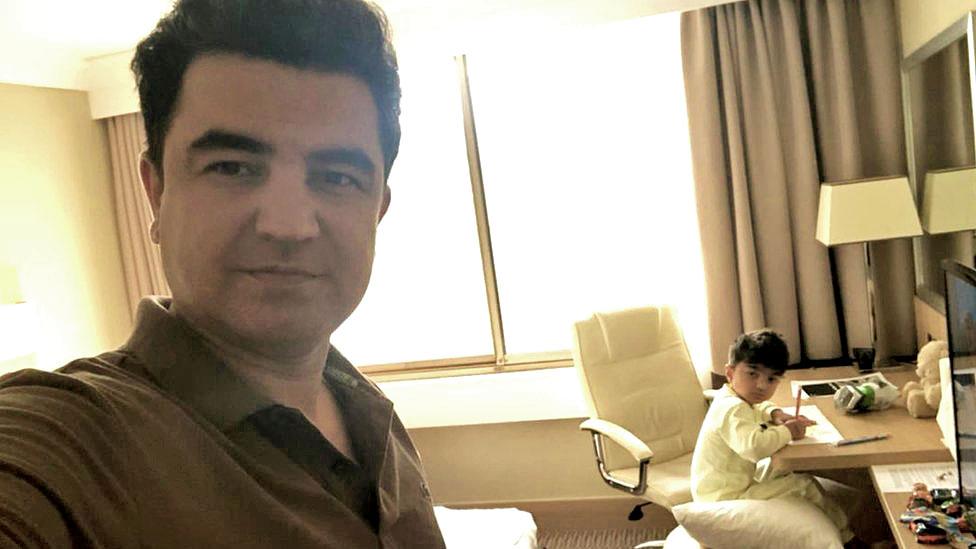Afghanistan: UK and Taliban in talks over further evacuations
- Published

Taliban soldiers at Kabul airport
The UK is in talks with the Taliban to secure safe passage out of Afghanistan for a number of British nationals and Afghans who remain there.
The talks, involving UK officials and senior Taliban members, are taking place in Doha, Qatar, No 10 said.
The defence secretary is understood to have told MPs that between 150 and 250 people eligible for relocation - plus their families - remain in the country.
It comes after a Taliban pledge to allow further departures.
Commenting on the UK-Taliban negotiations, a No 10 spokesman said: "The prime minister's special representative for Afghan transition, Sir Simon Gass, has travelled to Doha and is meeting with senior Taliban representatives to underline the importance of safe passage out of Afghanistan for British nationals, and those Afghans who have worked with us over the past 20 years."
Foreign Secretary Dominic Raab will face questions from MPs later over his handling of the UK's withdrawal from Afghanistan.
Opposition parties called for his resignation last month after it emerged he had been unavailable to make a phone call about evacuating interpreters while he was on holiday in Crete.
Mr Raab subsequently said that "with hindsight" he would not have gone away, but dismissed the idea that he was "lounging on the beach" as "nonsense".
Labour's shadow foreign secretary, Lisa Nandy, said Mr Raab had answers to give on "much more than the chaos of the last two weeks", adding: "The foreign secretary had 18 months to prepare but was missing in action."
Downing Street has insisted that Prime Minister Boris Johnson has "full confidence" in Mr Raab and there are "no plans" for a Cabinet reshuffle.


Details of the talks between the UK and the Taliban are sparse.
A statement from Downing Street says they will "underline" the importance of Afghan nationals being granted safe passage out of the country, which suggests the talks may be about the importance of the issue rather a negotiation over logistics.
And it's a delicate bit of diplomacy - the UK wants something from the Taliban but doesn't want to bestow too much legitimacy on them before the nature of their administration becomes clear.
But Sir Simon is well qualified for the job, which he's been in for a few weeks. He was Nato's most senior non-military representative in Afghanistan, spent years as a top official in the Foreign Office and helped negotiate the Iran nuclear deal.

On Tuesday, Mr Raab said more than 17,000 people had been evacuated by the UK from Afghanistan so far, including over 5,000 UK nationals.
He also said the UK needed to face the "new reality" in Afghanistan and work with other nations to exercise a "moderating influence" on the Taliban.
Former British ambassador to Afghanistan between 2010 and 2012 Sir William Patey said engaging with the Taliban could help prevent a refugee crisis and avoid the country becoming a host for terrorists.
"[The Taliban] know they can't run this country without help," he told the BBC's Newsnight, adding that the UK had "some cards" in the talks because "they're going to have to engage".

Sir Simon Gass, pictured in 2013, is the prime minister's special representative for Afghan transition
Victoria Atkins, who has been appointed Afghan Resettlement minister, told BBC Breakfast the Taliban would "be relying on international aid - and we want that to be forefront of their mind when we are discussing with them and third countries".
Asked whether the talks would legitimise the Taliban, she said that was the "great debate for the Western world" but any talks were being "done carefully", and the government was determined to ensure those eligible in Afghanistan could leave.
The Taliban have declared victory in Afghanistan following the withdrawal of US troops, with fighters streaming into Kabul airport on Tuesday. British troops left the country over the weekend.
The militants have promised those with authorisation will be allowed to leave the country, and US Secretary of State Anthony Blinken pledged to "hold the Taliban to their commitment".
But Dame Barbara Woodward, the UK's ambassador to the UN, said they would be judged "on the basis of their actions on the ground, not their words".
In addition to the talks with the Taliban, the UK government said it was sending 15 "crisis response specialists" to Pakistan, Uzbekistan and Tajikistan to assist British diplomats in their work to allow people to reach the UK.
They are expected to focus on helping UK nationals, interpreters and other Afghans who were employed by the UK, and those Afghans judged most at risk.
The final flights bringing British troops arrive in the UK
Speaking to the BBC on Tuesday, a former English language teacher who is stranded in Kabul said he regretted working with the UK mission because he now fears for his life.
"Why did I work for people who left me and fled and left me alone here?" he asked.
The teacher, who the BBC is not naming, said he was now a target for the Taliban.
"They are looking for me because I've got pictures in billboards advertised for classes," he said.
He said he tried to escape Afghanistan shortly before the militants took control but received "no reply" to his application for resettlement, adding that he had been unable to sleep ever since.
Asked what he thought would happen to him if he could not leave and the Taliban found him, he added: "My fate will be the same, like others, like the people who work in military, in the media... they will kill me too."

Are you trying to leave Afghanistan? Do you have family trying to leave Afghanistan? Get in touch.
WhatsApp: +44 7756 165803
Tweet: @BBC_HaveYourSay, external
Please read our terms & conditions and privacy policy
Or use this form to get in touch:
If you are reading this page and can't see the form you will need to visit the mobile version of the BBC website to submit your comment or send it via email to HaveYourSay@bbc.co.uk, external. Please include your name, age and location with any comment you send in.
Related topics
- Published26 August 2021
